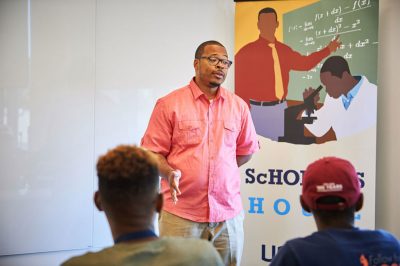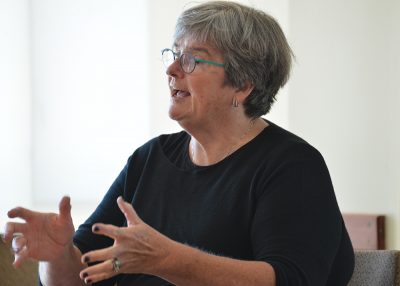Two research projects co-led by professors in the Neag School of Education have recently been awarded a total of more than $2.5 million in federal funding, made available through the National Science Foundation (NSF).

Windows of Opportunity for Black Male Engineers
Erik Hines, associate professor of counselor education in the Neag School’s Department of Educational Psychology, is co-principal investigator of a new project titled “Collaborative Research: Windows of Opportunity-Understanding Black Male Engineers in the Pursuit of Advanced Degrees,” which has been funded nearly $400,000 over four years by the NSF.
The project will center on understanding how to grow the pipeline of Black males acquiring advanced degrees in the field of engineering.
“Given the severe underrepresentation of Black males as engineering faculty and getting advanced degrees, I knew it was important to solve this issue, given my research focus on the academic success of Black males throughout the P-20 educational pipeline,” says Hines, who will work in collaboration with co-principal investigator Jerrod A. Henderson of the University of Houston. “Nationally, only a third of Black males graduate from college [with undergraduate degrees], which translates into less of them going to graduate school, particularly in STEM programs.”
“Nationally, only a third of Black males graduate from college [with undergraduate degrees], which translates into less of them going to graduate school, particularly in STEM programs.”
— Associate Professor Erik Hines
 Hines and Henderson will be examining the decision-making process of Black males who have pursued advanced engineering degrees, as well as the factors that influenced them, in order to better identify how to help Black males persist in engineering majors and in the field — and to eliminate barriers to access going forward. The study will also examine the assets and strengths these Black males possess, as well as the role of self-concept in developing their identity in the realm of engineering.
Hines and Henderson will be examining the decision-making process of Black males who have pursued advanced engineering degrees, as well as the factors that influenced them, in order to better identify how to help Black males persist in engineering majors and in the field — and to eliminate barriers to access going forward. The study will also examine the assets and strengths these Black males possess, as well as the role of self-concept in developing their identity in the realm of engineering.
“We would like to see more Black males in the engineering professoriate as well as [becoming] leaders in industry,” Hines says. “Diversity in this field helps us become a stronger country and compete globally.”
To learn more about this project, read the NSF award abstract in full.

Online Professional Development for Science and Math Teachers
Bianca Montrosse-Moorhead, associate professor of educational psychology, and Suzanne Wilson, Neag Endowed Professor of Teacher Education and head of the Department of Curriculum and Instruction, are co-principal investigators on a NSF-funded research project receiving more than $2.2 million in support over the next four years.
Titled “Integrating Computational Thinking in Mathematics and Science High School Teacher Professional Development,” the project will partner researchers from the Neag School and the Center for Discrete Mathematics and Theoretical Computer Science at Rutgers University to develop a comprehensive online professional development program for high school science and mathematics teachers.
“Many STEM teachers are now asked to integrate computational thinking into their curricula,” says Wilson. “With little knowledge of computational thinking or experience with how to integrate it with mathematics and science concepts, teachers are often left on their own to figure something out. The goal of this project is to get relevant, timely, and useful materials into the hands of teachers.”
The research will study how and under what conditions such materials support the development of teachers’ understanding of computational thinking; improve their instructional practice; and enable computational thinking in their middle and high school students.
“This is an area where we need more research. We still do not know a lot about the connections between professional development in computational thinking, teacher knowledge and practice, and student outcomes.”
— Bianca Montrosse-Moorhead, Associate Professor
“This work is both exciting and complex,” says Montrosse-Moorhead. “This is an area where we need more research. We still do not know a lot about the connections between professional development in computational thinking, teacher knowledge and practice, and student outcomes. That is also part of the complexity of this work. Studying the process of professional development, what happens when teachers go into their classrooms and put computational thinking ideas into practice, and then what happens for their students is more complicated than one would think.”
But the project, Montrosse-Moorhead adds, is not just about doing the research. “At the end of the day, we hope this project will advance our knowledge about embedding computational thinking in mathematics and science classrooms in ways that help teachers and students.”
Access the full award abstract on the NSF website.
Related Stories:
 Facebook
Facebook
 Twitter
Twitter
 LinkedIn
LinkedIn
